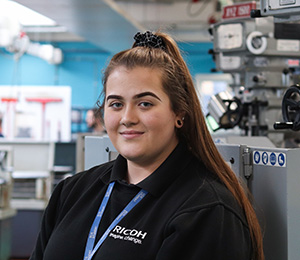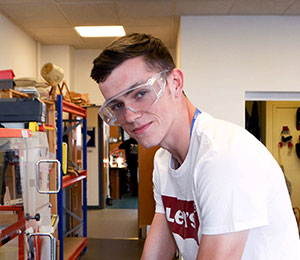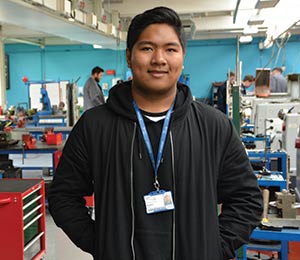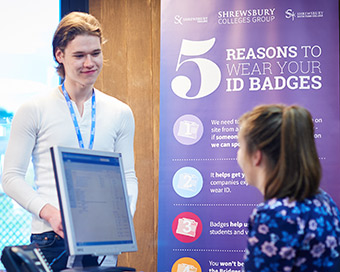T Level in Design and Development For Engineering & Manufacturing: Mechanical Engineering
| Mode of study | T Levels |
| Duration | 2 Years |
| Campus | London Road Campus |
| Start date | 2 September 2024 |
| Course code | FLR3TME (2426) |
About T Levels
T levels or Technical Levels are groundbreaking new qualifications which are equivalent to 3 A Levels. T Levels offer students a mixture of classroom learning and ‘on-the-job’ experience during an industry placement of at least 315 hours (approximately 45 days).
T Levels have been developed in collaboration with employers and businesses so that the content meets the needs of industry and prepares students for work, further training, or study.
T Levels are ideal if you have completed your GCSEs, and wish to continue your studies but also want to get into a skilled job. They are also great if you prefer a practical approach to your studies.
They enable you to build knowledge and experience to help you get the job you want. T Levels are developed in collaboration with employers and businesses so you will have the skills that employers in your chosen industry need.
T Levels are ideal for you if you are focused on a particular career or work skills and either want to progress to university, further training, an apprenticeship, or employment.
-
Who is it for?
This T Level is a new 2-year course which is taken after GCSEs and is broadly equivalent in size to 3 A Levels.
This course is suitable for anyone interested in a career in engineering, manufacturing, processing, and control. Students will develop an understanding of a broad range of issues relevant to the sector, including:
- working within the Engineering and Manufacturing Sectors – an understanding of how materials, conditions and context influence design processes and products
- essential Mathematics for Engineering and Manufacturing – a knowledge and understanding of Mathematics including standard matrices and determinants and standard trigonometry.
The T Level in Mechanical Engineering will enable you to secure a job in a wide variety of roles within the engineering sector. Progression options include engineering apprenticeships, further qualifications in engineering including HNDs, HNCs or degree courses, or you may decide to go straight into a full-time role.
-
Entry Requirements
GCSE Maths at grade 5 or above, plus 4 additional GCSEs at grade 4 or above (including English Language and Science).
-
What does the course involve?
The course will include the following topics:
- Design methodologies and processes
- Tools, equipment, and materials used in mechanical engineering
- Essential Mathematics and science for engineering and manufacturing
- Design, develop, test, and evaluate mechanical engineering and manufacturing systems and processes
- Analyse and interpret engineering and manufacturing requirements, systems, processes, technical drawings and specifications
- Evaluate systems, designs, components and processes, managing and integrating design information, proposals and specifications, to develop and improve mechanical engineering and manufacturing proposals and solutions
- Areas of the engineering industry in which mechanical engineers work
Your classroom learning will be supplemented with regular work placements with engineering companies in order to apply the skills that you are learning into practice.
-
How is the course assessed?
Varied assessment methods will be used including:
- Presentations
- Group work
- Portfolio of evidence
- Observation of activity
- Scenario projects
- External assessments
- Employer set project
-
What do I do next?
You can apply online via the APPLY NOW button and then add an additional two or three subjects to make up your academic programme. You can also apply for a second, alternative vocational programme of study via a separate application. If after reading this factsheet, you are still undecided about the course most suitable for you, please drop in to one of our Open Evenings, ring Admissions on 01743 260401 or email admissions@scg.ac.uk

Beth Knight
A Level Product Design (Media Studies and Music)
Previous school: Belvidere School
I took Product Design at A Level because I was inspired by my GCSE teacher. I really enjoy how hands on the subject is and using the computers to bring your designs to life. You can explore your creative side in a relaxed environment.

Chloe Millington
Engineering Apprentice at Ricoh
I studied Product Design at A Level and really enjoyed it. Taking on an Engineering Apprenticeship seemed like the natural progression from that, and I’ve appreciated every minute of it. It is great working for Ricoh and being able to study at SCG, as I get so many opportunities, such as taking part in WorldSkills.

Jason Roberts
A Level Product Design (Maths, Physics)
Previous school: The Priory School
Product Design gives you a lot of options for your future. I enjoyed the project where we had to make something out of a generic Ikea stool – I created an adjustable table. After College I would like to do an Apprenticeship with JLR.

Austin Luzadas
Level 3 in Engineering
Previous school: Holy Trinity School, Telford
Level 2 was mostly practical and this year on Level 3 there is a lot of theory and it's preparing me for university. I live outside of Shrewsbury and the transport links to the College are good.
Career Options
Are you an employer?
See how an apprentice can help your business.








